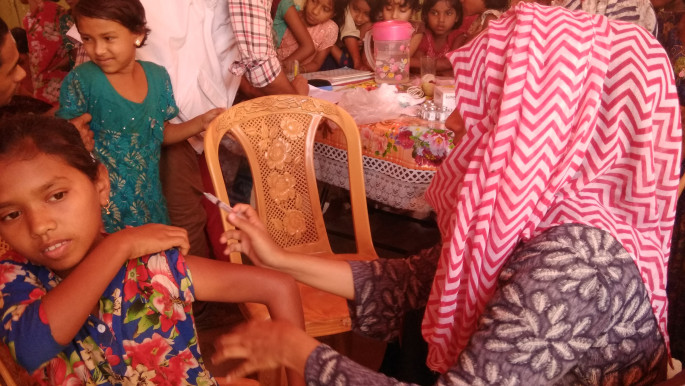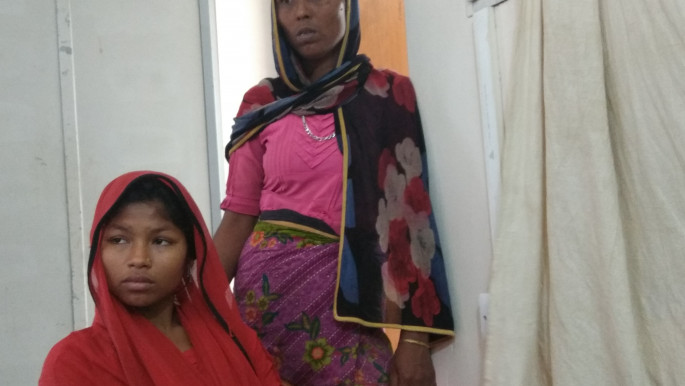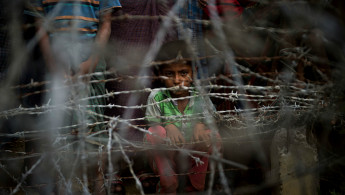Systematically terrorised: Rohingyas face severe health restrictions in Myanmar
Why did Gultaz, a Rohingya Muslim, not give birth to her daughter in Myanmar? Gultaz says she was admitted in a government hospital in Rakhine state.
"I was poorly treated at the hospital. The nurses mocked me, were careless and made me feel unsafe. When my husband demanded my release, the hospital refused. They let me go, only after my family placed a great deal of pressure on them and paid a lot of money," she said.
Ten years later, Gultaz, her husband and three children are among the thousands of Rohingyas who live in Kutupalong and other refugee camps in Cox's Bazar, following the August 2017 violence by Myanmar's military which forced them to leave the country.
The government of Myanmar does not recognise Rohingyas as citizens and has been systematically terrorising and forcefully displacing them, since many years. They face discrimination and severe restrictions in practically all areas of life – freedom of movement, in the practice of religion, access to healthcare and education, marriage and the number of children they can have.
"Even when sick, we were stopped from going to hospitals, which were also far from our homes. We would be turned away at the checkpoints by police or military unless we paid bribes. Those of us who did manage to reach a hospital, would either be denied admission or charged exorbitantly to be admitted," says Gultaz. According to her, even after being admitted to a hospital, the Rohingyas were not assured of reliable treatment.
 |
As a result, and because we were scared, we stopped going to hospitals. When we fell ill, we would consult rural medical workers who are barely qualified. Those who could afford it, went to Bangladesh for treatment. The rest simply died |  |
"As a result, and because we were scared, we stopped going to hospitals. When we fell ill, we would consult rural medical workers who are barely qualified. Those who could afford it, went to Bangladesh for treatment. The rest simply died."
Tasmina Begum who is in her mid-20s and fled Rakhine state in August 2017, too has a traumatic experience to share. A pregnant Tasmina did not go to the hospital to deliver her baby. When she developed fever, she took medicines prescribed by a local medic.
"After taking the medicines, I bled severely and lost the baby. But I was too scared to go to a hospital. I went to Bangladesh where I had a blood transfusion done at a private hospital in Cox's Bazar."
Dr Mohammed Abdus Salam, a government appointed civil surgeon at Cox's Bazar who has been treating Rohingya patients, attests to the poor health of the refugees.
 |
|
| A vaccination drive in progress at Balukhali camp [Urvashi Sarkar] |
"Malnutrition is high, especially among women and children – 161 cases of HIV have been detected since March 2018. Most people have not received vaccination and suffer from measles, rubella, diarrhoea, cholera and diphtheria."
Diphtheria became a major source of worry for the Bangladesh government which had nearly eradicated the disease among its people.
To prevent a fresh outbreak, the government with the help of aid organisations started mass vaccination programmes for the Rohingyas, local communities, and aid workers.
According to Dr Salam, the refugees who arrived last year were in a traumatised condition because they had been sexually assaulted, injured from mine blasts or gunshots, or had sharp cuts on their bodies.
 |
Refugees who arrived last year were in a traumatised condition because they had been sexually assaulted, injured from mine blasts or gunshots, or had sharp cuts on their bodies |  |
A health worker with the International Organisation for Migration (IOM) in Cox's Bazar and who did not wish to be named, said: "The Rohingyas did not receive information about family planning or maternal health treatment. Even medicines were not freely available, compelling the Rohingya to come to Bangladesh. This is just the tip of the iceberg, since the Rohingyas have been discriminated against in several other ways."
Human rights violations against the Rohingyas, including in the areas of health, were highlighted in a report published by Amnesty International last year.
According to the report, authorities in Myanmar have severely restricted Rohingya from accessing the state hospital in Sittwe, Rakhine state.
"Only in the most serious of cases will Rohingya patients be accepted, and even then, only after special permission has been given by the Rakhine State authorities and the sick must travel with a security escort. Once admitted, they are placed in separate "Muslim wards" and are vulnerable to extortion and other "fees" from police and hospital porters." The report described the situation as apartheid.
 |
|
| Najma (L) was beaten up during a brawl in the camp where she lives. In this picture, she is with her mother Romeda Begum at the Ukhia government health complex [Urvashi Sarkar] |
Another report of the Advisory Commission on Rakhine state – established by the Kofi Annan Foundation and Myanmar's Office of the State Counsellor with the assent of Nobel Peace Prize winner Aung San Suu Kyi – also notes the discrimination and human rights violations of Muslims in Rakhine state.
Suu Kyi was widely criticised for not coming out against the atrocities on the Rohingyas. This report too acknowledges discrimination against Muslims in Rakhine state, without mentioning the term Rohingya.
"While all communities suffer from inadequate medical services, access to health is particularly low within the Muslim community in the northern and central parts of the [Rakhine] state. The refusal of some health facilities to treat Muslim patients… prevent ready access to health facilities," the report says.
The allegations of genocide and human rights violations have been so far denied by the Myanmar government which has asked instead for "clear evidence."
Fortify Rights, an organisation based in South-East Asia and registered in the United States, and which does work in Myanmar, has called for the referring of crimes against Rohingya to the International Criminal Court (ICC).
"The rights of the Rohingyas have been abused in every possible manner and they have been discriminated against owing to their ethnicity and religion," said co-founder, Matthew F. Smith.
"The only way forward is for the UN Security Council to refer the situation in Myanmar to the ICC which should probe the allegations of genocide and prosecute as well."
Urvashi Sarkar is an independent journalist based in India and writes on international affairs and human rights. She is a 2016 fellow with the People's Archve of Rural India.
Follow her on Twitter: @urvashisarkar07



